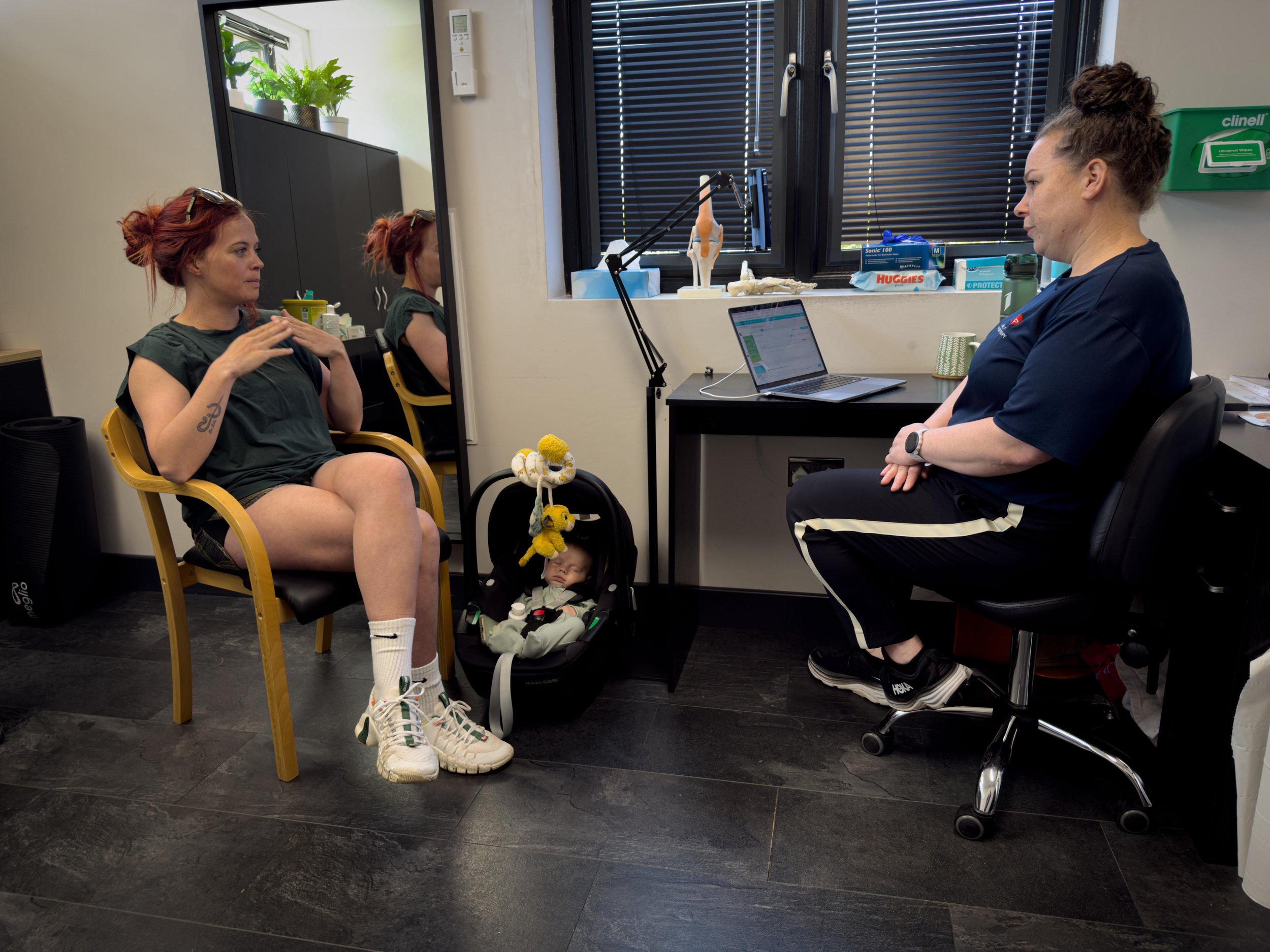
Women’s Health
Womens Health Physiotherapy is the treatment of problems within the pelvis or pelvic floor muscles. It is thought that one in three women will experience urinary incontinence at some point in their life. This number increases to around 50% of women participating in sports. Although incontinence is very common it is not normal and can be treated.
We treat:
Stress urinary incontinence (involuntary loss of urine with exertion, for example when coughing, laughing, running or jumping)
Urge urinary incontinence (leakage of urine when you cannot make it to the toilet in time)
Pelvic Organ Prolapse
Pain with sex
Diastasis Rectus Abdominis (Separation of the stomach muscles, common at the end of pregnancy and post-natally)
Pregnancy pain both ante and post-natally (pelvic girdle pain, rib pain and back pain)
Problems can occur for many reasons which can include:
Pregnancy
Childbirth, including obstetric injury
Menopause
Lifestyle factors
Weak pelvic floor muscles
Over-active pelvic floor muscles
Poor co-ordination of muscles around the pelvis
Stress urinary incontinence is prevalent in women during exertion such as running, there is no need to be embarrassed about it, and there is plenty you can do to get it better. Get booked in for your assessment with a specialist Physiotherapist and get the advice and treatment you need to get back doing the activities you enjoy.
You will be treated in a private treatment room with complete confidentiality by our Women's Health Specialist Physiotherapist. The assessment and treatment will be fully explained, and an individual treatment plan will be made as collaboration between you and the physiotherapist. At Absolute Physiotherapy we use the latest technology to inform the assessment and treatment process this includes real time diagnostic ultrasound
As with the musculoskeletal physiotherapy our goals will be driven by what you want to achieve.
DON'T SUFFER IN SILENCE!
Call 07851 228805 or email admin@absolutephysiotherapy.co.uk and our specialist physio will get back to you.
FAQs
What kind of questions will I be asked?
Your physio will ask you a number of questions to fully understand your problem. Some of the questions may seem unrelated to your incontinence. However, it is important to understand that the pelvic organs (the bladder, bowel, vagina and uterus) sit closely in the pelvis, and problems with one area can cause problems in adjacent organs as well. Your physio may ask:
What is the problem that is bothering you the most?
Some questions about your bladder function, including how often you go to the toilet during the day and night, if you leak urine (and if so, how much and how often), if you feel you have to rush to get to the toilet on time, and the kinds of symptoms you have when urinating, including any pain or feelings of incomplete emptying.
About your bowel function, including how often you empty the bowel, whether you find this difficult or painful, the consistency of your bowel motions, any loss of control from the bowel or any sense of having to rush to get to the toilet on time.
Questions about your childbirth history, including how many children you’ve had, the types of deliveries and the weight of the babies.
If you have any symptoms of prolapse, including a feeling of something dropping internally or a heaviness, lump or bulging inside the vagina or rectum.
Questions about sexual intercourse, including whether you find this painful or if you have any difficulties or concerns.
About your medical history, including current medical problems, the medications you are taking and any past operations.
What you do for work and in your leisure time, so they can understand how your problem may be impacting on your daily life.
Your physio may also ask you what you already know about your pelvic floor muscles and their function. They will often provide you with information on this before performing an examination, so you understand where they will be examining and why.
What kinds of examinations will be performed?
When seeing a physio for incontinence, it is likely that at some stage they will need to examine your pelvic floor muscles. This will commonly occur at the first appointment, but not always. Your physio will always ask you for permission before performing any examination, and you have the right to say no.
However, this may mean they cannot diagnose and treat your problem to their best ability, and they can discuss that with you.
A typical examination may include:
An examination of the external genital area. While this may be uncomfortable for some, it is important for your physio to check the skin for signs of infection, age-related changes and prolapse.
When performing an external examination, your physio may also ask you to try to contract the pelvic floor muscles, so they can see what happens from the outside in the vulva and your abdomen when you do this.
An internal vaginal examination may be performed. Your physio will use one or two gloved fingers to check the pelvic floor muscles internally. They can also check for prolapse and any tender or tight areas internally. They will ask you to contract and relax the muscles several times. This will usually be done lying down, but sometimes your physio may ask to check these muscles while you stand or sit.
A rectal examination may be performed instead of a vaginal examination if your main problem relates to bowel incontinence or a large tear resulting from childbirth. The physio will use one gloved finger to assess the pelvic floor muscles in the rectum. They will ask you to contract and relax the muscles several times.
Sometimes your physio may check other things like your posture in standing and sitting, and the way you move.
Helen has extra qualiifications in real time ultrasound so she may check your pelvic floor muscles using this modality. She may either use a probe placed over your low abdomen, or over the outside of your perineum (between the vagina and anus) to check the pelvic floor muscles.
What kind of treatments might be suggested?
Of course, the types of treatment(s) your physio recommends will depend on your individual problem. However, common treatment options can include:
A prescription of pelvic floor muscle exercises. Typically, these will be exercises to strengthen your pelvic floor or improve how well these muscles work when you cough, for example. Some women may be given exercises to learn to relax their pelvic floor muscles if their problem relates to the pelvic floor muscles being too tight or tense.
Bladder training strategies may be used if you often get an urgent or frequent need to go to the toilet. These strategies are used to help you gain back better control over your bladder habits.
You may be asked to do a bladder diary if you have not done one already.
Modifying the amount and type of fluid you drink or modifying your diet and fibre intake can sometimes be recommended.
Modifying various factors in your lifestyle may be recommended, such as the type of exercise you do or reducing heavy lifting. In many cases these modifications will be temporary until you can get better control over your incontinence.










